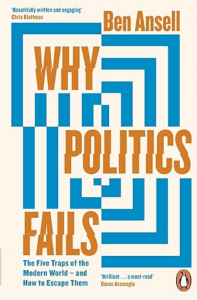There’s a sentence I underlined twice in Ben Ansell’s Why Politics Fails: “Politics makes growth.” This is my main takeaway from editing a series of policy essays from my colleagues in the Productivity Institute, which will be out at the end of November for National Productivity Week. If you ask people what are the two main causes of the UK’s dismal productivity in recent times they will pick what’s close to their own interests – various skills policies (the madness of the student loan system, the dreadful FE system, the madness of tearing up painstakingly-agreed T-levels for a new system…), R&D policies and the lack of institutions to enable the commercialisation of innovations, low investment levels because of a gazillion tax changes and low saving. But every essay circles back to politics: the politics of ‘announceables’, of over-centralisation, of silos, and so on.
Anyway, Why Politics Fails is an excellent introduction that does what it says in the title: it analyses political failures through the lens of five traps or, more accurately, trade-offs. The first chapter is about the tension in democracy between honouring majority preferences and protecting minorities. The equality trap is the trade-off between equal rights and equal outcomes. The third chapter is about solidarity, manifested only in situations of individual need. The security trap is the balance between (too much) anarchy and (too much) order. And the prosperity trap concerns the short-run economic (and electoral) gains looking more attractive than long-run decision-making that will enable prosperity over time.
The book has lots of examples, contemporary and historical. It would make an excellent additional read for students, as well as being accessible to the general readership (and Reith Lectures audience). I liked its emphasis on the delicate role played by a country’s institutions – for example, the book suggests an argument against UBI is its institutional fragility, compared to making improvements in existing, well-established welfare states. And the prosperity chapter rightly points to the importance of institutions as bulwarks against short-termism. It occupied me for a trans-atlantic flight & I enjoyed reading it.


Pingback: Politics and economics | The Enlightened Economist – passiveangel.com